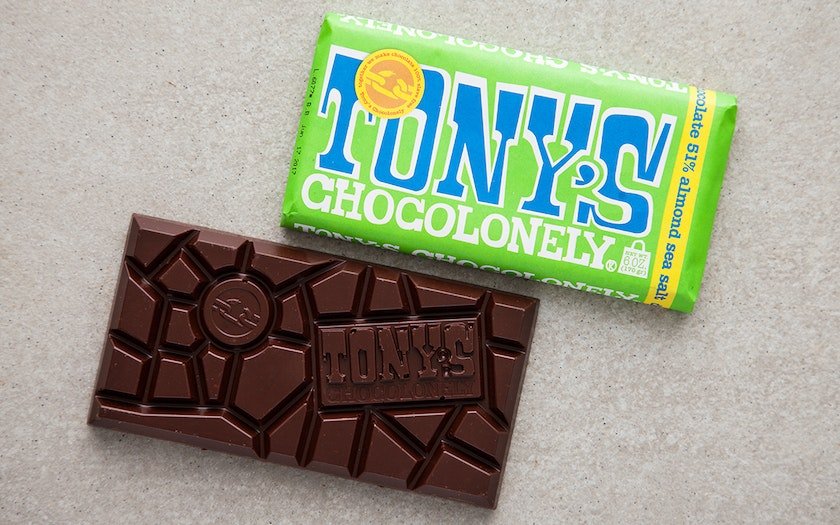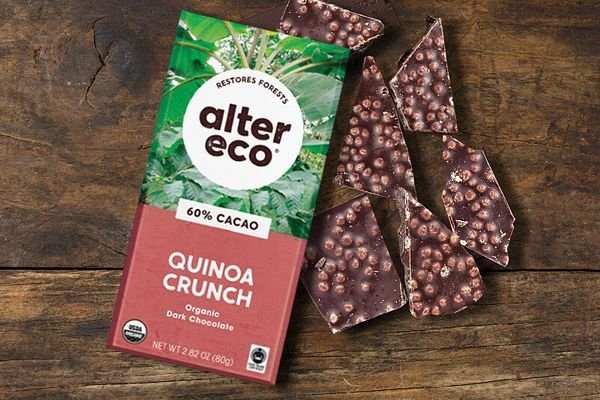Bunnies and Bilbies and Eggs: OH MY!
As I hop into my local supermarket this week, I find myself overwhelmed by chocolate- dark, light, milk, mylk, some labelled ‘sustainable’ and others ‘fair trade’. I’m on the hunt for the elusive “ethical” chocolate just in time for Easter- but where do I even begin?
Whether you celebrate or not, given Easter is the biggest time of year for chocolate sales, it’s a good time to consider where our chocolate comes from, who made it and how this time of indulgence may impact people hidden deep in chocolate supply chains.
Chocolate: A Bitter History
The latest update from the Walk Free Foundation estimates that approximately 50 million people are trapped in modern slavery globally, and cocoa production is considered one of the highest risk industries for forced and child labour. The history of forced labour in the chocolate industry dates back to Spanish colonisation of the Americas, with 16th century Spanish imperialists forcing Indigenous peoples to grow and harvest the bean for export. Prior to Spanish occupation, the cocoa bean had been employed in Mesoamerican nutrition and medicine, in ceremonies and religious rituals, and played an integral role in the Mayan economy, forming the basis of currency. The Mexicas considered cocoa to be a gift from the Gods, and the bean was considered to be of greater value than gold.
The Indigenous genocide committed by the Spanish in Central and South America, which saw an estimated 90% of Indigenous peoples killed, led to the loss of thousands of years of cultural practices and traditions tied to the cocoa bean. The cultivation of the cocoa tree had, however, been retained, inciting an increase in the trafficking of African peoples through the transatlantic slave trade to work on cocoa plantations in the Americas and in the Caribbean.
As love for chocolate beverages grew in Europe, the demand for cocoa, and the sugar that accompanied it, resulted in even greater numbers of people forced into slavery in order to meet demand. When machinery sped up the grinding process, the chocolate bar was invented through combining cocoa, sugar and cocoa butter. This made chocolate, a product previously only available to members of the aristocracy, affordable for the masses.
The 20th century saw the mass production of chocolate, and the rise of chocolate empires including Nestle, Cadbury, Lindt, Mars and Hershey. Cocoa farming is small-scale and decentralised, and generally provides income for the majority of the community surrounding the farms. In the last few decades, demand (primarily from ‘western’ countries) for extremely cheap products has seen African, South American, and South-East Asian cocoa farmers competing in a race to the bottom to retain the supplier contracts with confectionary brands that fund their livelihood.
The International Labour Organisation (ILO) estimate that 3700 people are victims of forced labour in cocoa agriculture in Ghana alone. The ILO cites several reasons for the high rates of modern slavery in the cocoa industry, including the chronic poverty of farmers, low levels of education in regions of cocoa agriculture, a lack of governance and transparency in small-scale farming, low prosecution rates and price instability of cocoa on the global market.
Be Slavery Free, a coalition of civil society organisations working to educate and collaborate to end slavery, found that only 6% of the price of a standard chocolate bar is paid directly to cocoa farm owners. In order to earn a living wage, famers would need to earn 4-5 times that amount. This low income is then passed on to the workers on farms, with multiple instances of forced labour and child labour being identified on cocoa plantations in recent years, with many having been trafficked into slavery. According to the US Department of Labour, there are 2.1 million children working in the cocoa sector, 43.9% of whom are in conditions that could be considered child labour.
In 2021 a lawsuit was filed against some of the world’s largest chocolate companies by eight young adults who claim they were forced to work without pay on cocoa plantations as children, alleging the companies aided and abbeted their enslavement to keep cocoa prices low. The lawsuit was dismissed, with the companies claiming the “overbroad legal theory could leave too many people liable for forced child labour, including consumers and retailers who might benefit from lower prices” (Reuters). When hearing this claim, I’m inclined to ask: are the lower prices really worth it?
If, like me, you find yourself lingering in the chocolate aisle, unsure of which of the hundreds of brands to choose from, what any of the certifications mean and whether it’s all just greenwashing, then read on.
Easter chocolate: what to eat and what to bar
I am keenly aware of the privilege I hold to be able to choose what chocolate I eat (or to buy such a luxury product at all). Generally speaking, ethical and sustainable doesn’t correlate with affordable and accessible.
So, which companies produce ‘ethical’ chocolate, and where can it be bought?
Finding brands of chocolate that have a minimal impact on people and planet can seem like a really tricky task. There are so many brands out there, so many claims and so many certifications, that often it feels like information overload. On top of that, you have to deal with the often-greater cost associated with ethical products.
Ultimately, we have to choose a brand that best aligns with our values and has the credibility to back up its ‘ethical’ claims, whilst still being in a price range that meets our budget.
The Chocolate Scorecard from Be Slavery Free is a great place to start when looking for ‘ethical’ chocolate, with many brands available in Australia listed. The scorecard provides an overview of a company’s performance in key areas in relation to labour rights, traceability and transparency, and environmental impact.
The number 1 chocolate brand on the list, which was awarded the 2023 ‘Good Egg Award’, is Original Beans, a Netherlands based brand focused on regenerative practices. Unfortunately, Original Beans is not yet available in Australia.
Our Picks
Teya’s Favourite Bar
The bar in the number 2 spot, and my personal favourite, is Tony’s Chocolonely. Tony’s is another Dutch chocolate company that was founded 13 years ago with the aim of producing chocolate with a supply chain free from slavery. In 2005, after learning of the rampant slavery in the cocoa sector, journalist Teun van de Keuken attempted to have himself prosecuted for child labour due to having bought and eaten chocolate, claiming it is comparable to consuming stolen goods. Van de Keuken even hired a lawyer to help build the case against himself, however the judge would not convict him. He then decided to try to change the industry himself and created Tony’s Chocolonely.
“We’re not a chocolate company, we’re an impact company that makes chocolate.”
-Henk Jan Beltman, Chief Chocolate Officer, Tony’s Chocolonely
Where to buy in Australia:
Harris Farm Markets, some local IGAs and a number of online stores
Average RRP of a bar:
$8.99
Size of average bar:
Large
Dietary:
Vegan, dairy free and gluten free options
SD Strategies Taste rating:
Dark Chocolate Almond Sea Salt: 9.5/10
Richard’s Favourite Bar
Richards favourite chocolate bar comes from AlterEco, a French and Dutch brand (we’re sensing a theme here) with a focus on sourcing from farmer-owned co-ops practicing sustainable agriculture. Alter Eco provide plenty of info on the co-ops they buy from in Peru, which, coincidentally, is where Richard had a go at making his own chocolate from scratch (with mixed results...). The recipes on the Alter Eco website using their chocolate are an added bonus – try the vegan chocolate avocado mousse and chocolate pumpkin bread!!
Where to buy in Australia:
IGA, FoodWorks, GoVita, Oxfam, Harris Farm and at Alter Eco’s online store.
Average RRP of a bar:
$4.50
Size of average bar:
Medium
Dietary:
Vegan, dairy free and gluten free options
SD Strategies Taste rating
Deep Dark Quinoa Crunch: 10/10
Sonja’s Favourite Bar
Sonja’s favourite bar sparks memories of her childhood in Germany, when she would eagerly anticipate trips to her Nanny’s house in the hope her grandmother would slip her a mini pack of Ritter Sport in secret.
The added bonus- Ritter Sport is available at most Woolworths stores in regional NSW.
Ritter Sport was founded in 1912 in Germany and has long led the way in sustainable practices for large confectionary brands in Europe. The company sources from 100% “certified sustainable” sources and claims to view this as a starting point towards sustainable practices. Ritter Sport acknowledges that there is much more work to do, particularly in relation to transparency and oversight of its supply chain. A new sustainability report is expected to be published by the company this year, and we will be keeping an eye on what progress has been made.
Where to buy in Australia:
Woolworths, Aldi, Harris Farm, some IGAs and local stores and online stores.
Average RRP of a bar:
$3.25
Size of average bar:
Medium
Dietary:
Vegan, dairy free and gluten free options
SD Strategies Taste rating
Dark Whole Hazelnuts: 8.5/10
Major Supermarket Brands
Some of our favourite brands are not as accessible as we would hope, both in terms of price point and availability in stores. So, what brands currently available in major Australian supermarkets are working towards being ‘ethical’?
Ritter Sport
Woolworths, Aldi
As mentioned above, Ritter Sport uses certified sustainable cocoa and is working towards transparency in its supply chain. The chocolate cannot be guaranteed as slavery free, but the company is taking small steps towards this.
Whittakers
Woolworths, Coles
One of Richard’s favourite bars based purely on flavour is the Whittaker’s Coconut Block. The brand ranked 9th on the Chocolate Scorecard, but has room for improvement in terms of ethical and sustainable practices.
Nestlé
Woolworths, Coles
After facing a number of allegations of labour rights abuses, modern slavery and child labour in its supply chain, Nestle is taking steps towards traceability, sustainability and ethical sourcing. The brand still has a long way to go, and is currently ranked 10th on the Chocolate Scorecard, the highest of any of the major global supermarket brands.
Wrapper up
Standing in the chocolate aisle, it’s up to you which bar you ultimately add to your cart. Although some ethical chocolate brands are sold in Australia, they may not be readily available in your area, or at a price that is within your budget this Easter. And that’s okay!
Being an ethical consumer isn’t about perfection, it’s about doing what we can with the options we have available to us. It’s about having an Easter treat that we can find locally, that is affordable and that we can feel good about.
So, which chocolate bar hits your sweet spot this Easter?
By Teya Duncan
Sonja and Richard with some Alter Eco and Tony’s Chocolonely!
Don’t forget to comment a photo on LinkedIn with your favourite ethical chocolate!!





